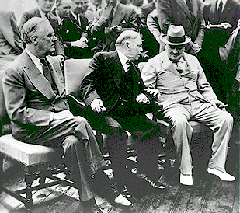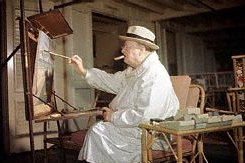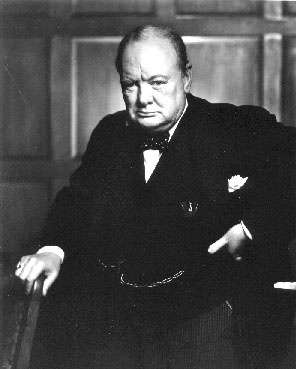by April Buchanan

Sir Winston Churchill
Sir Winston Leonard Spencer Churchill was the eldest son of Lord Randolph Churchill. He was born on November 30, 1874. He was a soldier, statesman, historian, writer, and reporter. He is probably best known for his stubborn and courageous leadership as the Prime Minister of Great Britain during World War II.
He graduated from the Royal Military College in Sandhurst in 1894, after that he was commissioned in the Forth Hussars in February of 1895. When he was on leave in 1895, he saw his first military action in Cuba as a reporter for London's Daily Graphic. After that he served in India and then in 1898, he fought at Omdurman in the Sudan under Kitchener. When he resigned his commission in 1899, he was sent to cover the South African Boer War by the Morning Post, where his accounts of his capture and imprisonment by the Boers and his escape raised him to the forefront of English journalists, making him a National Hero in Great Britain.

Churchill, Roosevelt and Stalin at the Conference of Teheran
He was elected to Parliament as a Conservative in 1900, but in 1904, he switched to the Liberal Party. He was the President of the Board of Trade between 1908 and 1910. After that he was appointed Home Secretary from 1910 to 1911, where he worked with David Lloyd George, and he championed innovative labor laws and old age pension acts. In 1911, he left Home Office and he became the First Lord of the Admiralty who presided over the naval expansion that preceded World War I.

Churchill, Mackenzie King and Roosevelt at Quebec City
Then in 1915, his career was almost destroyed as a result of his support of the unsuccessful Gallipoli campaign during the First World War. As a result he lost his admiralty post, but served on the front lines in France for the remainder of the war.
However, he was soon back in politics and he served as the Minister of Munitions under Lloyd George in 1917, then served as the Secretary for War and the Secretary for Air between 1918 and 1921. He was a member of the Coalition Party between 1917 until it's collapse in 1922.
For the next two years he was out of Parliament, but with the return of the Conservative Government in 1924, he was given the job of Chancellor of the Exchequer until the Great Depression hit England.
For ten years during the depression Churchill was denied cabinet office. But he wrote and remained in the public eye with his support for Edward VIII during his abdication, which the national government disapproved of, but the public supported.

Winston Churchill Relaxing
When Germany fell under the rule of Adolf Hitler, he issued unheeded warnings of the threat of Nazi Germany. When World War II broke out in September of 1939, Neville Chamberlain appointed him First Lord of the Admiralty once again on September 3, 1939.
In 1940, Churchill succeeded Chamberlain as Prime Minister and during World War II he successfully secured military aid and support from the United States. He traveled endlessly during the war. He met President Franklin Roosevelt at sea before the entry of the United States into the war, where they signed the Atlantic Charter. Twice he addressed the United States Congress, once on December of 1941, and then again in May of 1942. He went to Moscow twice to meet with Stalin, once in August of 1942 and then again in May of 1944. He visited the battle fronts, and he also attended a long series of international conferences. He established close ties with leaders of other nations and he coordinated the military strategy which led to Hitler's defeat. He was one of the truly great orators; his energy and his stubborn refusal to make peace until Adolf Hitler was crushed were crucial in rallying and maintaining British resistance to Germany during the grim years of World War II.
After the war, he was Prime Minister again from 1951 until his resignation in 1955. In 1953, he was knighted, and awarded the 1953 Nobel Prize in Literature for his writing and oratory. He retained a seat in Parliament until 1964.

Sir Winston Churchill (Official Government Photo)
Churchill was undoubtedly one of the greatest public figures of the 20th Century. Extraordinary vitality, imagination, and boldness characterized his whole career. He died in 1965. His death marked the end of an era in British History. He was given a state funeral and was buried at Blenheim Palace.
Sources:"Toy Soldier Gallery" @ http://www.schrepf.com/TSG/Articles/Churchill/Churchill-e.html, 5/10/00
"Winston Churchill" @ http://tceplus.com/churchil.htm, 5/10/00
"Churchill: The Evidence" @ http://www.churchill.nls.ac.uk/, 5/10/00
Picture #1 – "Sir Winston Churchill" from: http://www.schrepf.com/TSG/Articles/Churchill/Churchill-e.html
Picture #2 - "Churchill, Roosevelt and Stalin" from: http://www.schrepf.com/TSG/Articles/Churchill/Churchill-e.html
Picture #3 – "Churchill, Mackenzie King and Roosevelt" from: http://tceplus.com/churchil.htm
Picture #4 - "Winston Churchill relaxing" from: http://search.corbis.com/
Picture #5 – "Winston Churchill (Official Government Photo)" from: http://www.schrepf.com/TSG/Articles/Churchill/Churchill-e.html